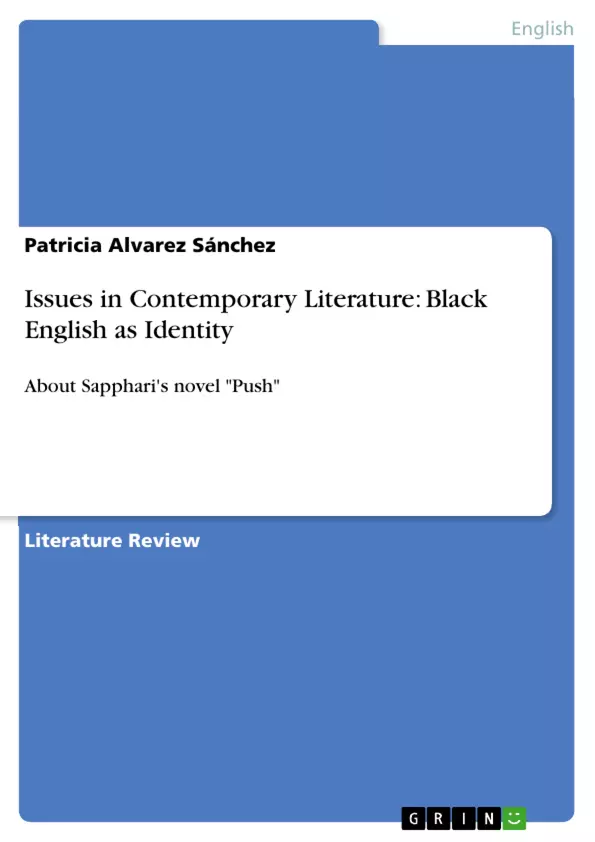Language is one very special way we have to communicate with other
human beings. It unites members of similar cultures who learn to share through
the same experiences and to see the world through the same vocabulary. There
are at least as many cultures as languages in the world. As Wilhelm von Humboldt
mentioned “The variety of languages is not merely a variety of sounds and signs,
but in fact a variety of world views.” Undoubtedly, languages are a unifying
element that brings identity and uniqueness to every human being because they
tell the rest of the world, where we come from, where we have lived and who we
are.
This paper deals with Black English, also called African American English or
Ebonics, as an African American linguistic variety of American English and the
way it is reflected in the novel Push (1997) by Sapphire. It discusses Black English
as a way to express and define black identity and their unique culture. There is a
parallelism in the oppression of a language and the culture it represents, as we
can clearly appreciate in the case of Black English. While Ebonics has been
oppressed by the predominant Standard English, blacks were violently silenced by
“standard” North Americans. It was not until recently that Ebonics´ uniqueness
has been interpreted neither as a mispronunciation of English, nor as a series of
grammatical mistakes due to ignorance or lack of education. Unfortunately, both
blacks´ language and their culture have suffered from manipulation and have
been bent to fit the needs of the dominant class.
Sapphari´s Push (1997) is a novel that combines pure poetry and brutal
honesty and was also the first novel completely written in Ebonics. As such, it
arose an important controversy due to its novelty and harsh themes. It tells the
story of a black American adolescent who fights to survive a vicious cycle of
incest and abuse. Being obese, illiterate and lacking self-esteem, her father rapes
her repeatedly and she becomes pregnant for the second time, her first baby
having Down´s syndrome, and is, as a result, expelled from school.
Table of Contents
- Language as Identity
- Sapphire's Push: An example of Black English in Literature
- Black English and the Oppression of a Language
- Sapphire's Push (1997) and the Controversial Use of Ebonics
- Ebonics and Precious's Identity
- The Historical Roots of Black English
- The Linguistic Influence of West African Languages
- Examples of Ebonics in Sapphire's Push
Objectives and Key Themes
This paper aims to analyze the use of Black English, also known as African American English or Ebonics, in Sapphire's novel Push (1997). It examines how Ebonics functions as a linguistic representation of black identity and culture, highlighting the parallels between the oppression of Black English and the historical marginalization of African Americans. The paper also explores the role of Ebonics in Precious's journey of self-discovery and empowerment.
- Black English as a reflection of Black identity and culture
- The historical oppression of Black English and its connection to racial prejudice
- The linguistic features of Ebonics and their origins in West African languages
- The role of Ebonics in Precious's communication, self-expression, and literacy development
- The significance of Sapphire's use of Ebonics in Push and its impact on literary discourse
Chapter Summaries
The paper begins by exploring the concept of language as a means of communication and cultural expression. It introduces Black English as a distinct linguistic variety of American English and its significance in defining black identity. The paper then delves into the historical context of Black English, examining the oppression it has faced and the connection to the broader history of racial discrimination in America.
Sapphire's novel Push is introduced as a groundbreaking work that features Ebonics as its primary language. The paper analyzes the novel's narrative, focusing on Precious's experiences of abuse, neglect, and her struggle to overcome adversity. It examines how Ebonics facilitates Precious's communication and provides a window into her internal world.
The paper then explores the historical and linguistic origins of Black English, tracing its roots back to West African languages and the development of Plantation Creole. It examines specific linguistic features of Ebonics, highlighting its syntax and phonology, and provides examples from the novel to illustrate these features.
Keywords
Black English, African American English, Ebonics, Sapphire, Push, Identity, Culture, Language, Oppression, Historical Context, West African Languages, Plantation Creole, Syntax, Phonology, Literacy, Empowerment.
Frequently Asked Questions
What is Ebonics or Black English?
Ebonics, also known as African American English (AAE), is a linguistic variety of American English that serves as a unifying element for Black culture and identity.
How is Black English used in the novel "Push" by Sapphire?
"Push" was the first novel written entirely in Ebonics, using the language to provide a brutally honest and poetic portrayal of the protagonist Precious's internal world.
Is Black English just "bad grammar" or "mispronunciation"?
No, the paper argues that Ebonics has its own unique syntax and phonology, often rooted in West African languages, and is not a result of ignorance or lack of education.
What are the historical roots of Ebonics mentioned in the paper?
The paper traces the roots back to West African languages and the development of Plantation Creole during the era of slavery in North America.
How does the oppression of language relate to racial oppression?
The paper draws a parallel between the silencing of Black Americans and the marginalization of their language, both having been manipulated to fit the needs of the dominant class.
Why was the novel "Push" controversial?
It was controversial due to its harsh themes (incest, abuse, illiteracy) and its groundbreaking use of Ebonics as a literary medium.
- Citation du texte
- Licenciada en Filología Inglesa Patricia Alvarez Sánchez (Auteur), 1999, Issues in Contemporary Literature: Black English as Identity, Munich, GRIN Verlag, https://www.grin.com/document/180682



